FILE - Belarusian President Alexander Lukashenko speaks to the media at a polling station after voting during the presidential election in Minsk, Belarus on Sunday, Oct. 11, 2015. For most of his 27 years as the authoritarian president of Belarus, Alexander Lukashenko has disdained democratic norms, making his country a pariah in the West and bringing him the sobriquet of 'Europe's last dictator." Now, his belligerence is directly affecting Europe. (AP Photo, File)
The Associated Press
MOSCOW (AP) - For most of his 27 years as Belarus' authoritarian president, Alexander Lukashenko's repressions and truculent statements frequently offended the West. This year, that belligerence is directly affecting Europe.
His government forcefully diverted an airliner flying between Greece and Lithuania that was carrying a political opponent. As the European Union imposed sanctions for that action, Belarus responded by easing its border controls for migrants from the Middle East and Africa, allowing them to head for the EU frontier.
That has forced Poland, Latvia and Lithuania to declare a state of emergency in their border zones to halt illegal crossings. Warsaw has sent thousands of riot police and troops to bolster security, leading to tense confrontations.
Lukashenko has since raised the stakes by threatening to cut off natural gas shipments from Russia that transit Belarus - a potentially severe blow to Europe as winter settles in.
The moves are a dramatic escalation for Lukashenko, who became president in 1994 when Belarus was an obscure country that had existed less than three years.
His disdain for democratic norms and the country's dismal human rights record has made Belarus a pariah in the West, bringing him the sobriquet of 'œEurope's last dictator.'ť
The 67-year-old Lukashenko prefers to be styled as 'œBatka'ť - 'œFather'ť or 'œDad'ť - a stern but wise patriarch.
Although he has made occasional moves toward rapprochement with the West, Lukashenko abandoned conciliation after massive demonstrations rose up against him in 2020 following an election to a sixth term as president. The opposition, and many in the West, rejected the outcome as rigged.
Tens of thousands of protesters were arrested, many of them beaten by police; main opposition figures either fled the country or were jailed; foreign journalists were driven out; and ordinary citizens reportedly were arrested for 'œunauthorized mass gatherings,'ť that included even birthday parties.
By suppressing opposition through such harsh actions, along with keeping much of the economy under state control, Belarus has become a neo-Soviet outlier, wary of its thriving NATO and EU neighbors. He alternately quarreled with and cozied up to Russia.
He's noted for mercurial actions and provocative statements, which a leaked U.S. diplomatic cable assessed as outright 'œbizarre.'ť
In 2006, he threatened protesters by saying he would 'œwring their necks like a duck.'ť He also attracted uneasy notice this year in a Christmas season TV interview when he let his fluffy little dog walk on the table among the festive dishes.
His draconian dramatics spiked in May, when he ordered a Lithuania-bound Ryanair jetliner diverted to Minsk and arrested self-exiled opposition journalist Raman Pratasevich, who was aboard. Belarusian authorities said the action was taken after a bomb threat was made against the plane, but Western officials dismissed that as a preposterous attempt to disguise what they called an act of piracy.
The strapping Lukashenko presents a tough-guy image by frequently playing ice hockey, including a spring 2020 outing where he dismissed the coronavirus by asking a TV reporter if she saw any viruses 'œflying around'ť in the arena. He also advised Belarusians to 'œkill the virus with vodka,'ť go to saunas and work in the fields to avoid infection, saying 'œTractors will cure everybody!'ť
Once well-regarded by his countrymen as an anti-corruption leader, Lukashenko lost their trust through decades of jailing opponents, stifling independent media and holding elections that gave him term after term in power.
Protests had broken out after some of the balloting, but not sizable or sustained enough to long withstand club-swinging police and mass detentions. Only after the 2020 vote did his opponents seem to harness the discontent: The economic deterioration and Lukashenko's cavalier refusal to act against COVID-19 added to their long-term dismay.
The protests lasted for months, petering out only when winter set in. But authorities didn't let up, reportedly arresting people for no obvious cause or on pretenses such as wearing clothing in the red-and-white colors of the opposition.
Lukashenko was born in a Belarusian village and followed a conventional path for an ambitious provincial Soviet. After graduating from an agricultural academy, he became a political instructor in the border guard service and eventually rose to director of a collective farm. In 1990, he became a member of the Belarusian Supreme Soviet, the republic's parliament.
He was its only member in 1991 to vote against the dissolution of the Soviet Union. When he won the new country's first presidential election three years later, he appeared in many ways to be stuck in time, keeping Belarus as an eerie and dysfunctional Soviet vestige.
While neighboring ex-Soviet republics adapted to capitalism, Lukashenko kept much of the Belarusian economy under state control. That initially won him support because Belarusians did not suffer the pain of 'œshock therapy'ť economic restructuring.
But ossified state control of industries couldn't keep up with the market's energy and flexibility; the Belarusian ruble was forced into repeated devaluations, and as of 2020, the average monthly wage was a paltry $480.
The country's main security agency retained its symbolically baleful acronym of KGB. He also pushed a referendum that made the new national flag nearly identical to the one Belarus used as a Soviet republic.
Belarus still has capital punishment, unlike every other country in Europe, even echoing Soviet show-trial executions that take about two minutes in all: The prisoner is reportedly brought to a room, told all appeals have been rejected, forced to kneel and then shot in the back of the head.
When Lukashenko became president, Belarus had little experience of being an independent country; as a Soviet republic, it had been a piece of other empires with only a brief attempt at sovereignty after World War I. Sandwiched between Russia to the east and reformist, Western-looking Poland, Lithuania and Latvia, Belarus was in a strategic position.
Lukashenko leaned strongly east. In 1997, he signed an agreement with Russia on forming a 'œunion state'ť of close economic, military and political ties, but stopped short of a full merger.
The agreement bolstered the economy in Belarus, which depends heavily on Russian oil at below-market prices. But Lukashenko harbored beliefs that Russia aimed to eventually take over Belarus entirely, and he was increasingly vocal about them.
As protests roiled the country in 2020 and Western pressure increased, Lukashenko had nowhere to turn for help but Moscow. Putin said he would be willing to send police to Belarus if demonstrations turned violent, but he never made that move.
This year, Lukashenko and Putin announced a broad range of agreements to solidify the union state, including a joint military doctrine. Although the agreements substantially increase Russia's influence in Belarus, Lukashenko also gains assurance of support.
FILE - Migrants from the Middle East and elsewhere gather at the Belarus-Poland border near Grodno, Belarus, Monday, Nov. 8, 2021. For most of his 27 years as the authoritarian president of Belarus, Alexander Lukashenko has disdained democratic norms, making his country a pariah in the West and bringing him the sobriquet of 'Europe's last dictator." Now, his belligerence is directly affecting Europe. (Leonid Shcheglov/BelTA via AP, File)
The Associated Press
FILE - Migrants from the Middle East and elsewhere gather at the Belarus-Poland border near Grodno, Belarus, Monday, Nov. 8, 2021. For most of his 27 years as the authoritarian president of Belarus, Alexander Lukashenko has disdained democratic norms, making his country a pariah in the West and bringing him the sobriquet of 'Europe's last dictator." Now, his belligerence is directly affecting Europe. (Leonid Shcheglov/BelTA via AP, File)
The Associated Press
FILE - A Polish military helicopter lands next to troops near migrants gathering at the Belarus-Poland border near Grodno, Belarus, Friday, Nov. 12, 2021. For most of his 27 years as the authoritarian president of Belarus, Alexander Lukashenko has disdained democratic norms, making his country a pariah in the West and bringing him the sobriquet of 'Europe's last dictator." Now, his belligerence is directly affecting Europe. (Leonid Shcheglov/BelTA pool photo via AP, File)
The Associated Press
FILE - Migrants from the Middle East and elsewhere break down the fence as they gather at the Belarus-Poland border near Grodno, Belarus, Monday, Nov. 8, 2021. For most of his 27 years as the authoritarian president of Belarus, Alexander Lukashenko has disdained democratic norms, making his country a pariah in the West and bringing him the sobriquet of 'Europe's last dictator." Now, his belligerence is directly affecting Europe. (Leonid Shcheglov/BelTA via AP, File)
The Associated Press
FILE - Belarusian President Alexander Lukashenko looks on during Independence Day celebrations, in Minsk, Belarus on Friday, July 3, 2020. For most of his 27 years as the authoritarian president of Belarus, Alexander Lukashenko has disdained democratic norms, making his country a pariah in the West and bringing him the sobriquet of 'Europe's last dictator." Now, his belligerence is directly affecting Europe. (AP Photo, File)
The Associated Press
FILE - Demonstrators throw stones at police officers during an unauthorized rally in Minsk, Belarus on Friday, April 26, 1996. For most of his 27 years as the authoritarian president of Belarus, Alexander Lukashenko has disdained democratic norms, making his country a pariah in the West and bringing him the sobriquet of 'Europe's last dictator." Now, his belligerence is directly affecting Europe. (AP Photo, File)
The Associated Press
FILE - A woman covers herself with an Old Belarusian national flag shouts in front of a police line near the residence of President Alexander Lukashenko in Minsk, Belarus on Sunday, Sept. 6, 2020. For most of his 27 years as the authoritarian president of Belarus, Alexander Lukashenko has disdained democratic norms, making his country a pariah in the West and bringing him the sobriquet of 'Europe's last dictator." Now, his belligerence is directly affecting Europe. (AP Photo/File)
The Associated Press
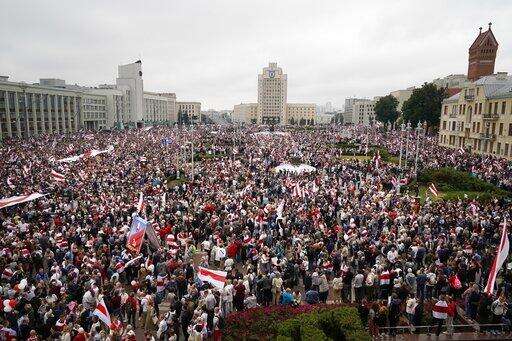
FILE - Belarusian opposition supporters rally against Alexander Lukashenko following an election to a sixth term as president at Independence Square in Minsk, Belarus on Aug. 23, 2020. For most of his 27 years as the authoritarian president of Belarus, Alexander Lukashenko has disdained democratic norms, making his country a pariah in the West and bringing him the sobriquet of 'Europe's last dictator." Now, his belligerence is directly affecting Europe. (AP Photo/Evgeniy Maloletka, File)
The Associated Press
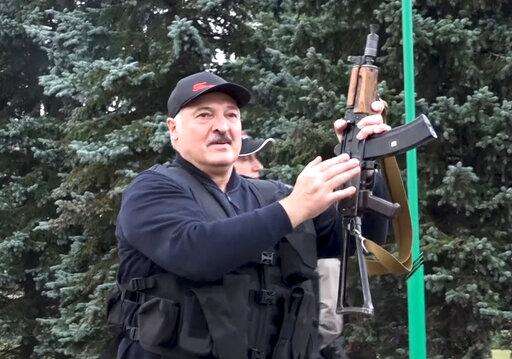
FILE - This photo made from video provided by the State TV and Radio Company of Belarus, shows Belarus President Alexander Lukashenko armed with a Kalashnikov-type rifle near the Palace of Independence in Minsk, Belarus on Sunday, Aug. 23, 2020. For most of his 27 years as the authoritarian president of Belarus, Alexander Lukashenko has disdained democratic norms, making his country a pariah in the West and bringing him the sobriquet of 'Europe's last dictator." Now, his belligerence is directly affecting Europe. (State TV and Radio Company of Belarus via AP, File)
The Associated Press
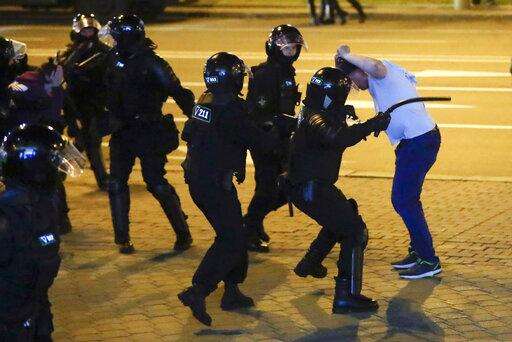
FILE - Riot police clash with a protester after the presidential election in Minsk, Belarus on Monday, Aug. 10, 2020. For most of his 27 years as the authoritarian president of Belarus, Alexander Lukashenko has disdained democratic norms, making his country a pariah in the West and bringing him the sobriquet of 'Europe's last dictator." Now, his belligerence is directly affecting Europe. (AP Photo, File)
The Associated Press
FILE - Police officers kick a demonstrator during a mass protest following presidential election in Minsk, Belarus, on Monday, Aug. 10, 2020. For most of his 27 years as the authoritarian president of Belarus, Alexander Lukashenko has disdained democratic norms, making his country a pariah in the West and bringing him the sobriquet of 'Europe's last dictator." Now, his belligerence is directly affecting Europe. (AP Photo, File)
The Associated Press
FILE - Protesters carry a wounded man during clashes with police in Minsk, Belarus, on Monday, Aug. 10, 2020. For most of his 27 years as the authoritarian president of Belarus, Alexander Lukashenko has disdained democratic norms, making his country a pariah in the West and bringing him the sobriquet of 'Europe's last dictator." Now, his belligerence is directly affecting Europe. (AP Photo/File)
The Associated Press
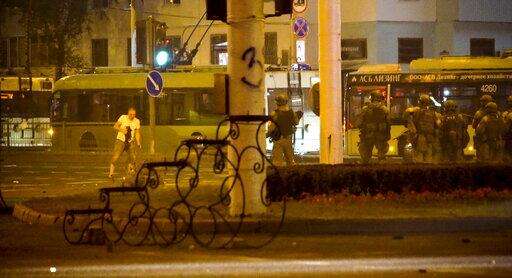
FILE - in this photo made from video, Alexander Taraikovsky is shot during a rally after the Belarusian presidential election in Minsk, Belarus on Monday, Aug. 10, 2020. Alexander Taraikovsky died as protests swelled, a day after Belarusian President Alexander Lukashenko's re-election to a sixth term in the Aug. 9, 2020. Authorities first claimed that Taraikovsky was killed when an explosive device he intended to throw at police blew up in his hands, but Associated Press video showed that he had no explosives when he fell to the ground. Lukashenko abandoned conciliation after massive demonstrations rose up against him in 2020 following an election to a sixth term as president. (AP Photo/Mstyslav Chernov, File)
The Associated Press
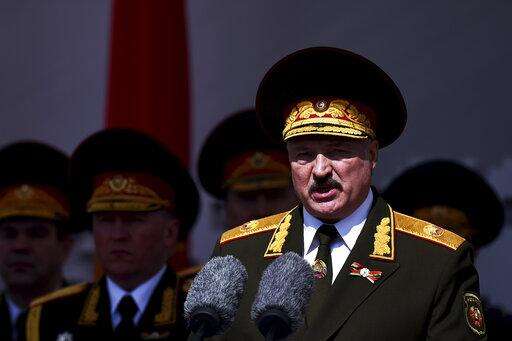
FILE - Belarusian President Alexander Lukashenko gives a speech during a military parade that marked the 75th anniversary of the allied victory over Nazi Germany, in Minsk, Belarus, on Saturday, May 9, 2020. For most of his 27 years as the authoritarian president of Belarus, Alexander Lukashenko has disdained democratic norms, making his country a pariah in the West and bringing him the sobriquet of 'Europe's last dictator." Now, his belligerence is directly affecting Europe. (Pool Photo via AP, File)
The Associated Press
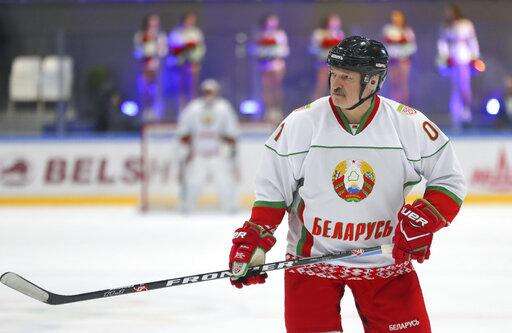
FILE - Belarusian President Alexander Lukashenko takes part in a hockey match during Republican amateur competitions in Minsk, Belarus, on Saturday, April 4, 2020. For most of his 27 years as the authoritarian president of Belarus, Alexander Lukashenko has disdained democratic norms, making his country a pariah in the West and bringing him the sobriquet of 'Europe's last dictator." Now, his belligerence is directly affecting Europe. (Andrei Pokumeiko/BelTA Pool Photo via AP, File)
The Associated Press
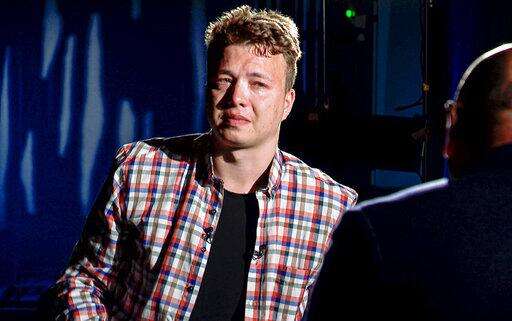
FILE - In this framegrab taken from video released by Belarusian state-controlled ONT Channel on Thursday, June 3, 2021, dissident journalist Raman Pratasevich reacts during his interview with Belarusian ONT Channel in Minsk, Belarus. For most of his 27 years as the authoritarian president of Belarus, Alexander Lukashenko has disdained democratic norms, making his country a pariah in the West and bringing him the sobriquet of 'Europe's last dictator." Now, his belligerence is directly affecting Europe. (ONT channel via AP, File)
The Associated Press
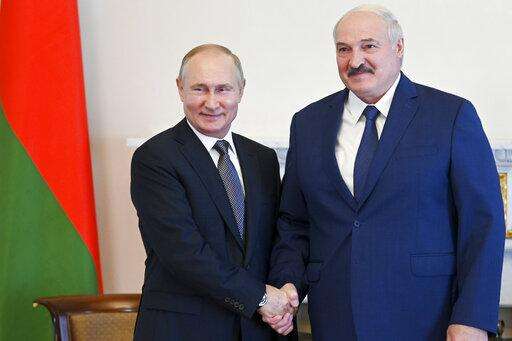
FILE - Russian President Vladimir Putin, left, and Belarusian President Alexander Lukashenko pose for a photo during their meeting in St. Petersburg, Russia, Tuesday, July 13, 2021. For most of his 27 years as the authoritarian president of Belarus, Alexander Lukashenko has disdained democratic norms, making his country a pariah in the West and bringing him the sobriquet of 'Europe's last dictator." Now, his belligerence is directly affecting Europe. (Alexei Nikolsky, Sputnik, Kremlin Pool Photo via AP, File)
The Associated Press
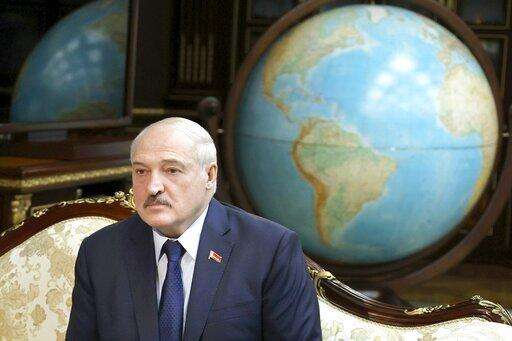
FILE - Belarusian President Alexander Lukashenko listens to World Health organization Director for Europe Hans Kluge during their meeting in Minsk, Belarus on Thursday, Oct. 14, 2021. For most of his 27 years as the authoritarian president of Belarus, Alexander Lukashenko has disdained democratic norms, making his country a pariah in the West and bringing him the sobriquet of 'Europe's last dictator." Now, his belligerence is directly affecting Europe. (Maxim Guchek/BelTA Pool Photo via AP, File)
The Associated Press